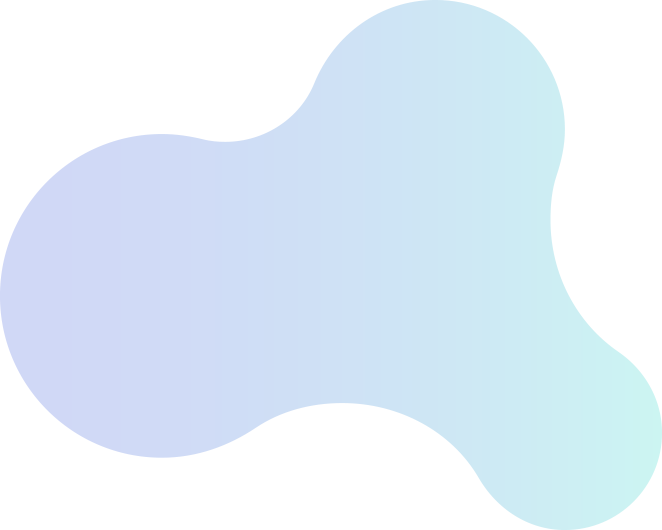
Scan the QR
to read the magazine on mobile phone
Editor’s note:
On August 19th, more than 14 million healthcare professionals across the country celebrated their holiday - Chinese Doctors' Day, as the guardians of people's lives and health, they honor life and are willing to dedicate themselves. Why did they choose to become a doctor? What have they learned over the years? This month, we are honored to invite several doctors from different specialties to tell us about their stories.
Q: Thank you all for taking this interview, please give us a brief introduction about yourself.
Zhai: I joined Luye in December 2022 as the Director of Traditional Chinese Medicine (TCM) at the TCM Department of Yantai Huayi Rehabilitation Hospital, specializing in TCM rehabilitation, and have more than 20 years of experience in this field.
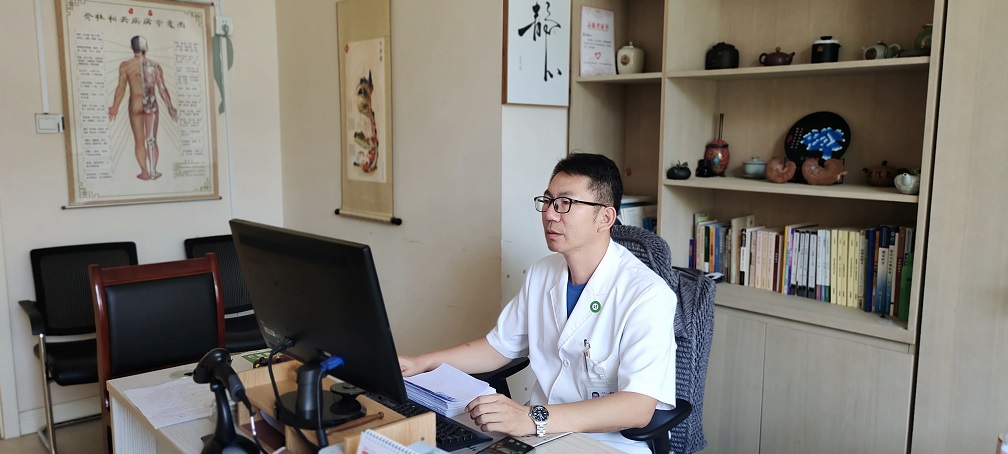
Zhai Hongxiao TCM Director of Yantai Huayi Rehabilitation Hospital
Li: I joined Celebright Plastic and Reconstructive Surgery Hospital as the Director of Anesthesiology in March this year, and I am currently in charge of the Anesthesiology Department's preparatory work. Prior to joining Luye, I worked in the anesthesiology departments of public general hospitals and private hospitals for more than 20 years.
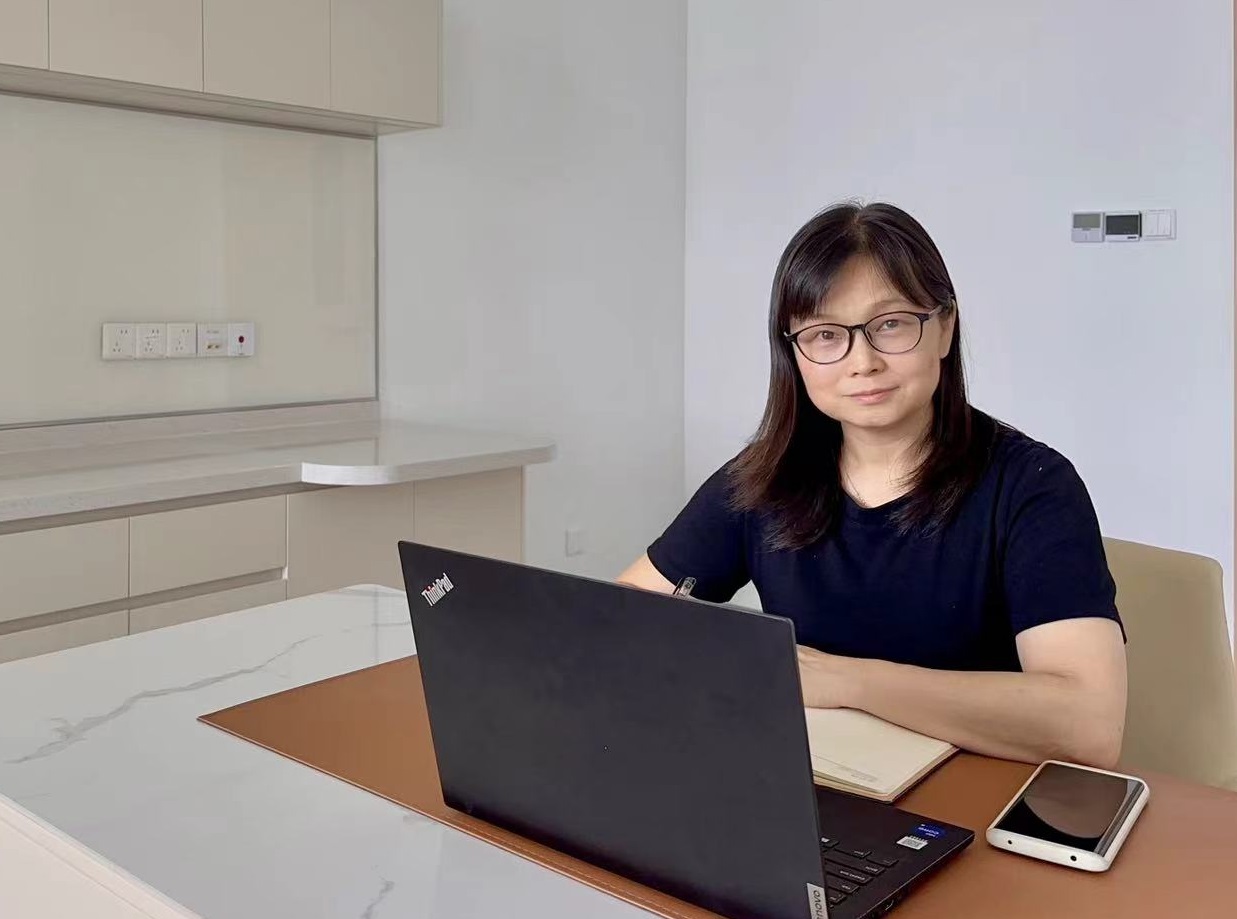
Li Nina Director of Anesthesiology, Shanghai Celebright Plastic and Reconstructive Surgery Hospital
Qiu: I joined Caring Guangzhou in May 2020 and am currently working in the Medical Department as the Director of Operations and Psychiatrist. In addition to daily clinical work, I am also responsible for the overall management of the medical department, including quality of care, family and patient communication, and external publicity in conjunction with the business development of the marketing department.
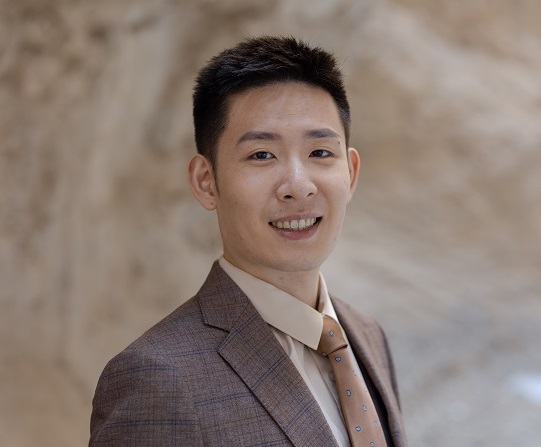
Qiu Yong Director of Clinical Department, Guangzhou Caring Medical
Wang: I joined Luye Medical Yantai Ellium Plastic Surgery Clinic as a Plastic Surgeon in December 2023, and I am mainly responsible for cosmetic surgery for clients, science communication of registered programs.
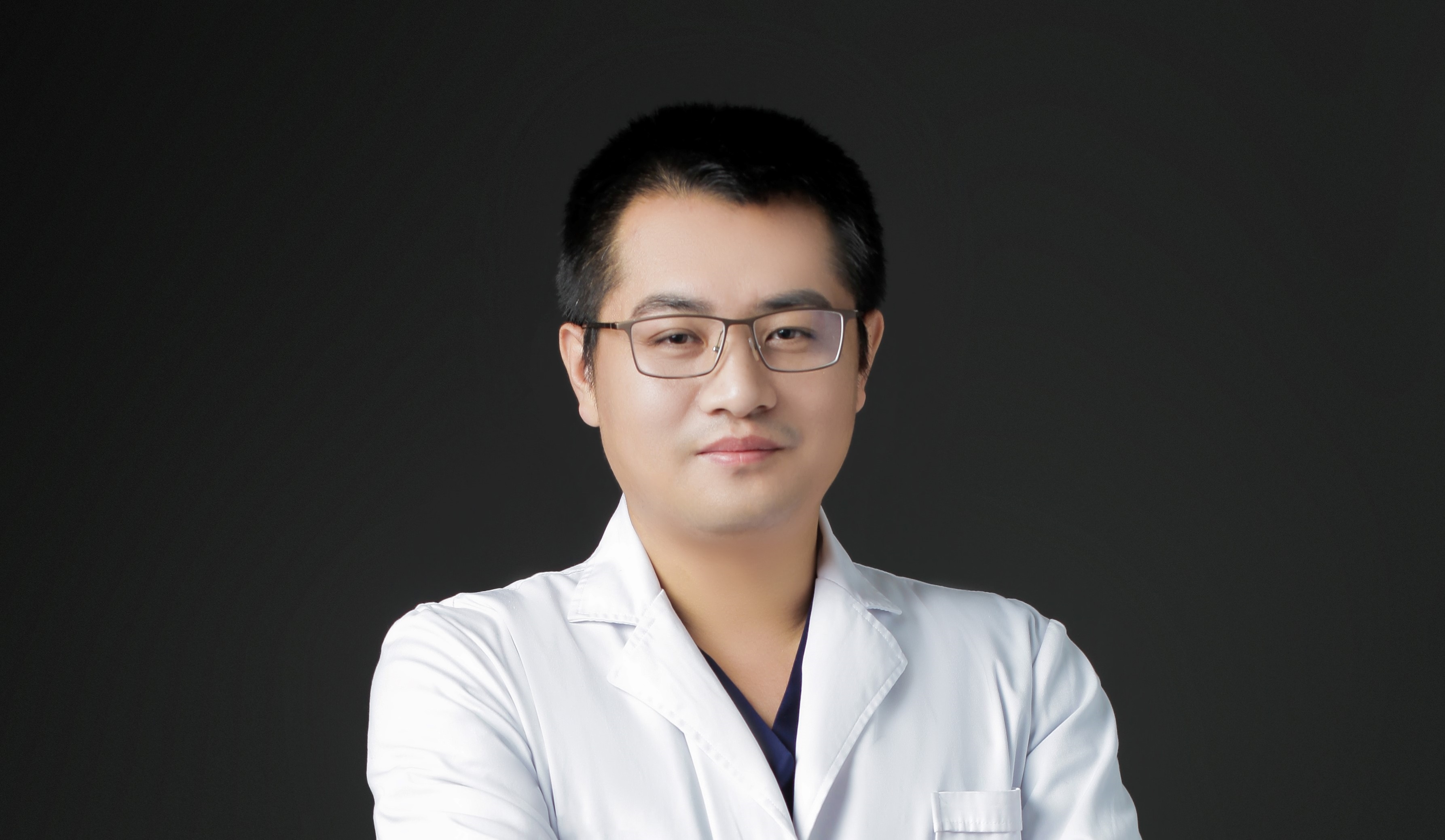
Wang Ping Plastic Surgeon of Yantai Ellium Plastic Surgery Clinic
Jiang: I graduated from the Medical School of Fudan University and worked at the Shanghai Mental Health Center after graduation, during which time I met a professor from the National University of Singapore who was visiting Shanghai, and then completed my PhD in Singapore, with a focus on neurocognitive disorders in the elderly. I joined Shenzhen Caring Clinic in April 2021 and am currently working as the Director of Medical Department. Caring is a physician-focused clinic, so in addition to my daily clinical work, I am also responsible for coordinating the interactions between the physician team and the nursing/pharmacist and counseling teams.
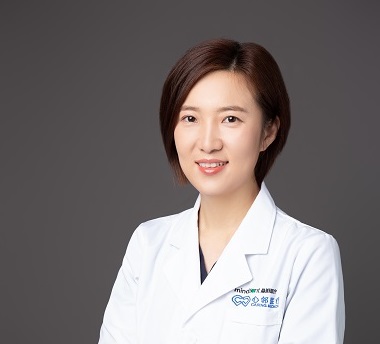
Jiang Minjun Director of Clinical Department, Shenzhen Caring Medical
Q: What is your original aspiration of becoming a doctor?
Zhai: When I was a kid, I heard stories about someone who had given up on treatment at a major hospital, and the doctor said the survival period was only 1-2 years, but by chance the person had been alive and well, and that's when I thought healing and saving people's lives was an amazing thing to do. There is a saying, “Wherever a poisonous snake lives, there will be an antidote within 100 steps”, and I would think: Is there an antidote within 100 steps when a person is sick? With this question, I chose to major in Integrative Medicine when I went to college.
Li: When I was a child, my grandfather had chronic bronchitis, and every winter when his symptoms worsened the family would bring the doctor in, and in a couple of days he would be fully recovered. At that time, I thought that the profession of a doctor was amazing, and if I could become a doctor myself, it would be a matter of pride to help others regain their health. After I started my medical career, my first job was in a military hospital. At that time, there was a teacher whom I particularly respected working in the anesthesiology department, I was lucky enough to become his student. During the working process, I gradually realized the meaning of “live to learn” that my teacher always urged us to do. Unlike other specialties, anesthesiologists need to face patients with different kinds of diseases, genders, age groups and physical conditions, and the corresponding anesthesia methods are different from person to person, which requires us to keep learning and accumulating solid clinical knowledge in practice.
Qiu: When I was in high school, I watched an American TV show called “Dr. House”, and I thought it was cool that doctors cracked the process of complex diseases, and that medicine had a charm similar to solving a mystery and cracking a case, where you need to find the cause of the disease and thus provide targeted treatment. I had the opportunity to rotate internships in different departments during my undergraduate studies, and in the process I expanded from being curious about physical health to being curious about people, and realized that I preferred working with people and wanted to understand and help others from a physical, interpersonal standpoint, so I chose psychiatry.
Wang: When I was a child, I used to go to the doctor's house next door and was curious about all kinds of medicines and syringes. When the SARS virus broke out in 2003 when I was still in high school, I saw the people's fear of the disease and the medical staff's dedication to saving lives, which caused a lot of ups and downs in my heart. I chose medical school without any hesitation when I applied for universities, I feel that the profession of doctor is very sacred, it can change a person's life and destiny, and even change the whole society, I hope that I can also contribute to the medical career in the future. In 2015, the hospital where I worked planned to set up a burns and plastic surgery department, I was recommended and participated in the relevant professional training, and have since embarked on the path of plastic surgery.
Jiang: The reason why I wanted to be a doctor at first was simple: I was afraid of death. 1988 was the year of the Hepatitis A pandemic, and I was unfortunately infected, and the hospitals were overcrowded at that time, which was a very bad experience for me as a young girl, and I felt for the first time that life was so fragile. This experience contributed to my wanting to be a doctor because I wanted to know how to live a healthier life. During my undergraduate years we would go on rotations to various departments, and I realized that some people were healthy, but they were still unhappy. I have come to understand that human health is not only about being physically free of illness and disease, but also about being mentally happy. I wanted to help people with mental problems regain a positive attitude toward life, so I chose psychiatry.
Q: What is your understanding of doctors’ responsibilities?
Zhai: Doctors are a profession that requires lifelong learning. We often say that Chinese medicine is in the people, and its roots do not only come from books, patients are our best teachers. As doctors, we have to constantly reflect on our practice. There is often a discussion in society: Which is better, Western medicine or Chinese medicine? From my professional point of view, Chinese medicine has a more theoretical basis, but how are we going to explain it clearly to our patients in an easy-to-understand way? This is a question that I have been thinking about in the course of my medical practice, and I need to answer questions for my patients from the perspectives of Chinese medicine culture, its background and origins.
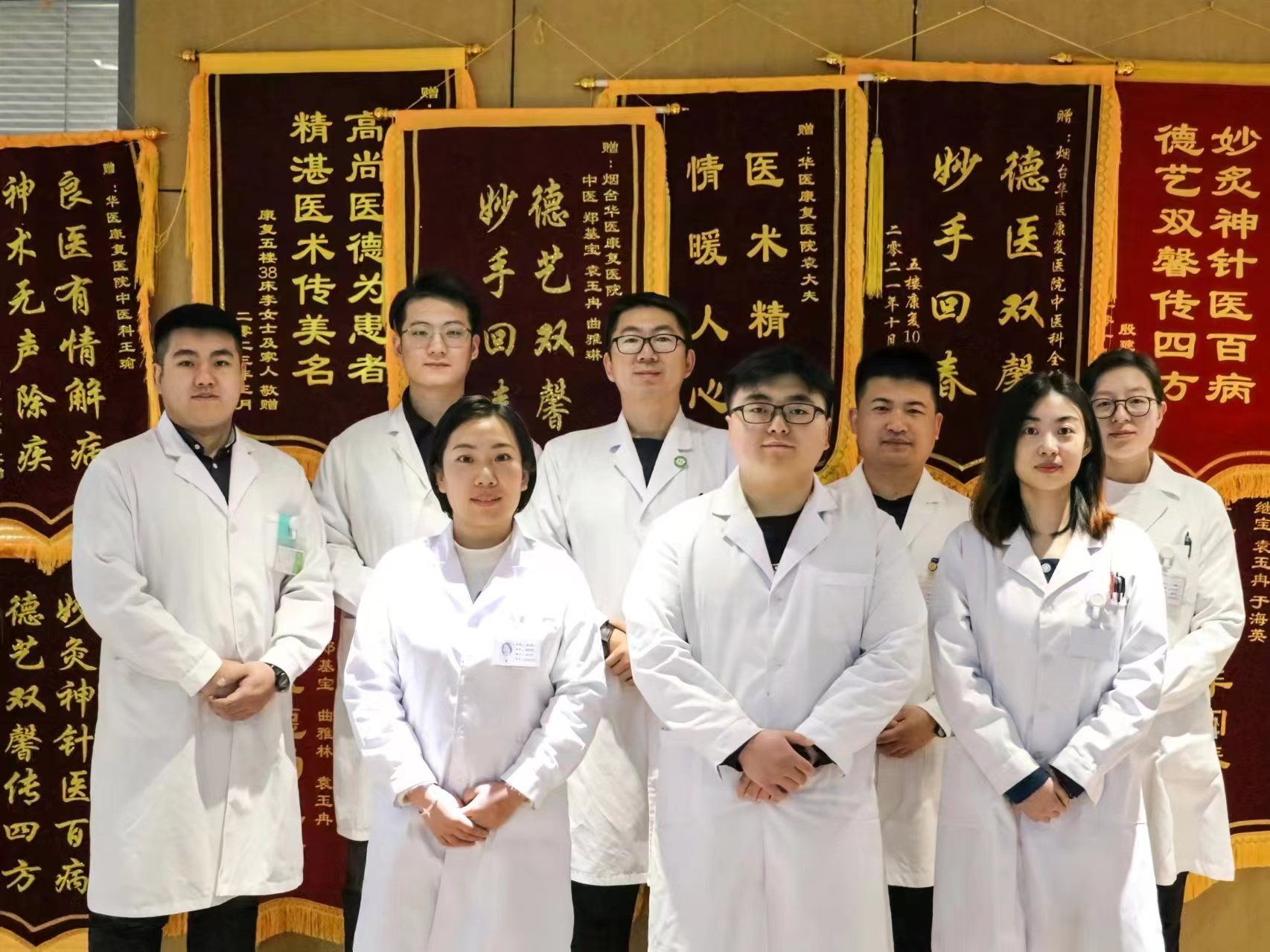
Dr. Zhai and his team
Li: The longer I work in this profession, the more I feel the important responsibility of a doctor. Anesthesia is only a part of a surgery, but it may affect the patient's life, so I do my best for each patient in my work and cannot afford to be negligent. In our work, we have come across some patients who are at risk due to not being able to cooperate well with the preoperative fasting, so the doctor needs to communicate in an easy-to-understand way so that the patient understands the risks and can cooperate better.
Qiu: There is a saying “Human beings are weak and ignorant in the face of diseases. I think the most important responsibility of doctors is to help patients reduce their fear of diseases and help them overcome them. For example, when patients are afraid of drugs, we need to explain and give them full confidence to cooperate with the treatment.
Wang: The meaning of doctor has two folds: on the one hand, we use medical technology for the benefit of mankind and society; on the other hand, we need to respect life, love life, and protect life. A doctor's role is to save lives, alleviate illnesses, bring warmth, and guide people to respect and cherish life. When it comes to the medical aesthetic industry that I am engaged in, I remember my teacher at school said that 70%-80% of customers have some psychological problems. Surgery is part of the job, and the other part is psychological counseling and comforting to relieve clients' stress.
Jiang: The longer I work in this field, the more I feel that there is actually very little a doctor can do, but even limited understanding and help can make a patient progressively better. Everyone experiences depression or anxiety at some point in their lives, and some of them get stuck in a bad situation that they can't get out of, and the psychiatrist acts as a life coach, working as a team with the patient to help them work together to find a way out of the quagmire. Take adolescent patients as an example, human beings go through a rapid period of psychological growth between the ages of 12-20 years old, and as long as we can make an accurate diagnosis, and provide them with reasonable treatment and support, they can show radical positive changes within 1-2 years, which is a very fulfilling thing for me.
Q: In daily life, the rehabilitation techniques of Western medicine are more widely known, but how do you, as an expert in the field of traditional Chinese medicine rehabilitation, break through the public perception and promote Chinese medicine rehabilitation physiotherapy?
Zhai: As the old saying goes, “Chinese medicine is about what happens in the field”. The ultimate goal of rehabilitation in Chinese medicine is to go back to the field and work, which is people-oriented and emphasizes the harmonization of yin and yang. An academician of Chinese medicine once compared Chinese medicine to Western medicine. Western medicine treats diseases by killing mosquitoes and flies, while Chinese medicine eradicates the garbage that breeds flies and mosquitoes. The two have different focuses on rehabilitation, with Western medicine focusing on exercise, while Chinese medicine focusing on harmonization. When we use Chinese medicine to regulate the patient's yin and yang, the rest of the recovery is a matter of course, and this is a concept that we will explain over and over again to our patients in the clinic. Normally, I see 15-20 patients per day and usually communicate with the patients about their medical history, stringing together the past history and its associated mechanisms, and analyzing the whole picture to explain the interplay between the diseases. My TCM rehabilitation philosophy has been widely recognized by the people in Qixia, Zhaoyuan, Haiyang, Laiyang, Longkou and other surrounding counties and cities, treating more than 20,000 patients, and building up a good reputation through word-of-mouth among patients.
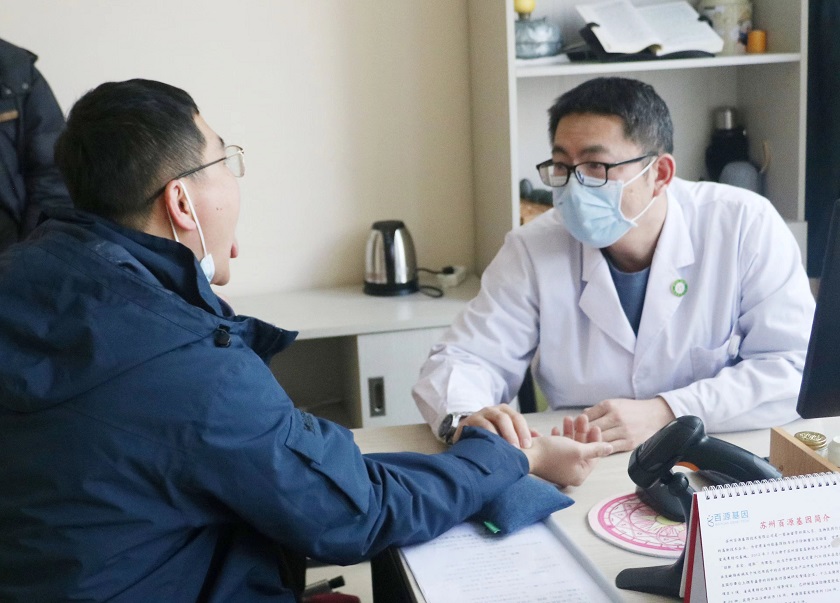
Dr. Zhai consulting with a patient
Q: Anesthesiology is a multidisciplinary practice that requires close collaboration among all medical staff in the clinic. Celebright Hospital is now in the final stage of opening, please briefly introduce the progress of the anesthesiology department of the project.
Li: We can understand anesthesia as the entire process of an airplane from takeoff to landing. The medical staff will provide the patient with a basic knowledge of anesthesia during the first communication. After the patient is admitted to the hospital, we need to go to the ward to understand the patient's basic physical condition, history of chronic illness or drug allergy. During the operation, we need to work closely with the surgeons and nurses, and the anesthesiologist has to adjust the anesthesia accordingly to the habits of different surgeons. After the operation, the patient enters the anesthesia recovery stage, which is equivalent to the landing of an airplane, and this period of time is also relatively high risk, we need to pay attention to the patient's blood pressure and heart rate to ensure that the patient wakes up smoothly.
CeleBright now has 16 modern operating rooms with purification standards of 100 and 10,000 levels, and shadowless lights, anesthesia machines and monitors have been installed. Our equipment is from first-tier brands with reliable performance to ensure the safety of our patients during surgery. We have an experienced medical and nursing team, and the pre-service training is already underway.
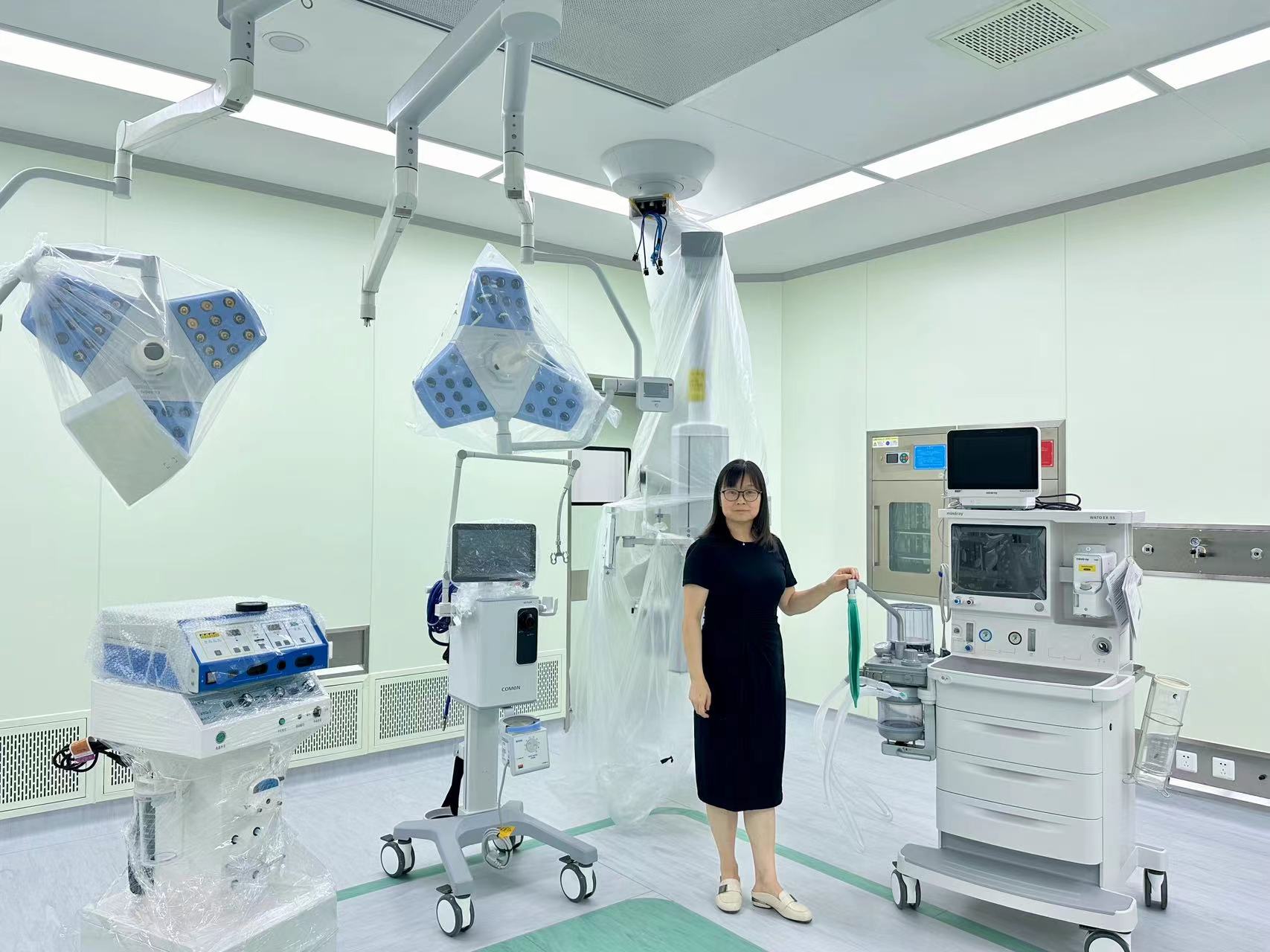
Celebright Operating Theatre
Q:As an expert in the field of adolescent mental health issues, what are the focused areas when seeing a teenage patient? You also do a lot of webinars; what advice do you have for parents?
Qiu: I have found that some of the children with mental health problems are high-achieving students whose pressure does not come from their parents, but who gradually feel the pressure of society as they grow up and internalize this into high expectations of themselves. Compared to their parents, adolescents are more open to mental health issues, they are aware of their problems and reach out to their parents for professional help. Instead, some parents are resistant to this and do not seek medical attention until their child has a more serious emotional breakdown.
For parents of adolescents who are already sick, a prerequisite for ensuring that treatment goes well is to recognize the fact that their child is sick. In reality, however, this is quite difficult for some parents, who believe that their child is living in a nice environment and that this can't be an illness, the kid is just not strong enough. Children have symptoms when they are sick and they crave attention from their families, but some parents intentionally ignore them, which can make the symptoms last longer. I have also seen some parents refusing to recognize that their children are ill and preventing them from taking medication as prescribed. Mental health treatment is a constant process, and some parents are very cooperative and insist on bringing their children for regular follow-up appointments even when they live far away.
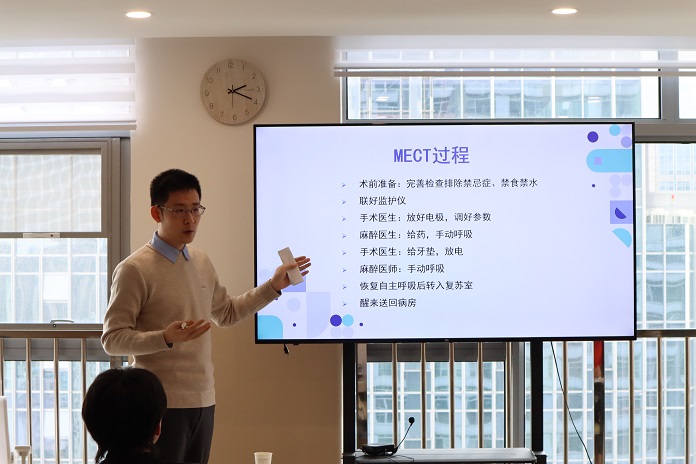
Dr. Qiu is giving mental health lessons to International High School students
Q: Unlike other specialties, patients not only have professional and technical requirements for medical aesthetics, but also value personalized needs and services, how should doctors achieve a balance in this process to create a better medical experience? From a professional perspective, what do you think about the “appearance anxiety”?
Wang: Communication is very important. Each customer comes to the clinic with his or her own ideas, and the doctor has to give professional advice based on them. If our advice does not meet their expectations, we must use communication to reshape their expectations. Ellium adheres to the principle of medical profession oriented and the treatment is led by doctors, and has established a set of professional consultation mechanism. The doctor's assistant is responsible for collecting customer information before the consultation, following up after the operation and making an appointment for the next consultation. Doctors are responsible for consultation, understanding the needs of customers and giving professional solutions, creating a reassuring experience, and the overall compliance of customers is very good.
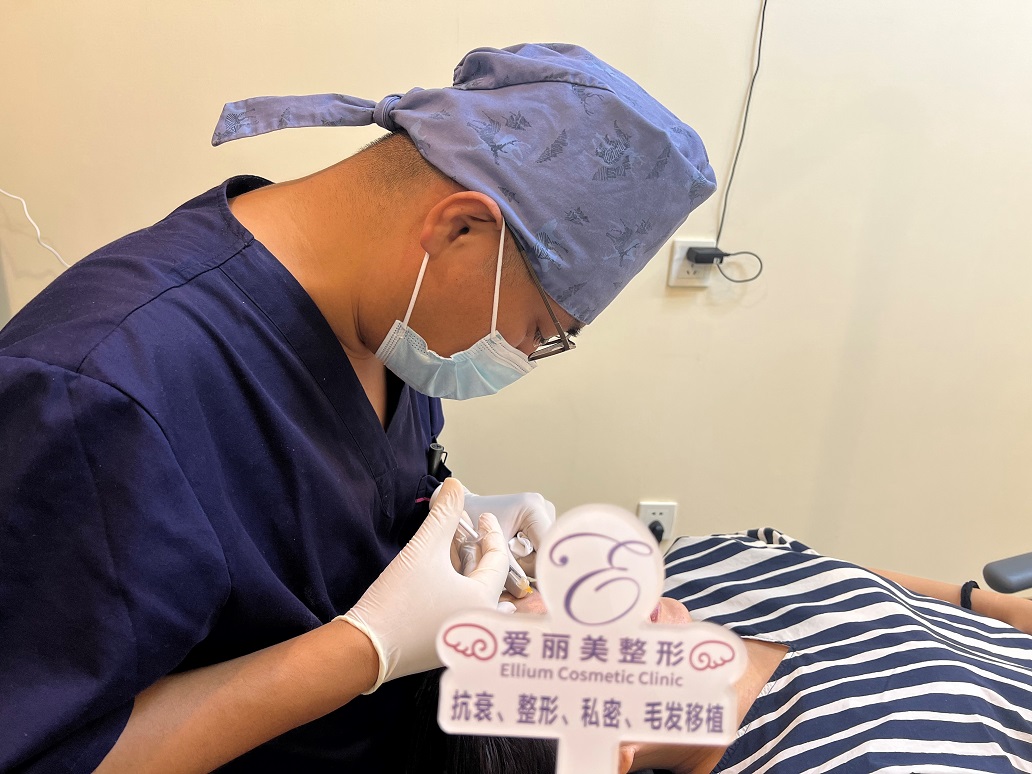
Dr. Wang performs medical aesthetic treatments for patient
When it comes to “appearance anxiety”, I think that on the one hand, it is the customers’ dissatisfaction with their look, and on the other hand, the pressure brought by social competition, which are invariably transformed into anxiety. I actually believe that beauty is unique to all people and there are no one size fits all. I have certainly seen the positive changes that successful medical aesthetics can bring to a customer. I once had a client who was very unsure of her nose and always felt that it was the reason why she had repeatedly failed in her blind dates. Six months after I completed her rhinoplasty, I received her wedding invitation. She thanked me and said I have brought positive changes to her life. So sometimes I feel a sense of fulfillment when I see the beautiful transformation I can bring to my clients.
Q: Aging population is becoming a main trend of our country in the long term. You have many years of research and clinical experience in cognitive disorders in the elderly and psychogeriatric disorders, please talk about how we should take care of the elderly with such problems, what are the misconceptions and precautions from a professional point of view?
Jiang: For patients with geriatric cognitive impairment, we can use more aggressive treatments and interventions to prolong their functioning. If we do not take any intervention, it takes about 10 years for an elderly person to go from the onset of symptoms to the point of complete decline to the point of needing full care. Being able to age with dignity is very valuable to elderly patients.
Currently, we see that many elderly people are not brought to the clinic by their families until they develop somatization symptoms or when their behavior seriously interferes with normal family life. Unlike young people, older patients still have a sense of stigma about psychiatric mental illness, and it will take time to improve the openness and acceptance of society as a whole towards this issue.
Q:With the continuous deepening of population aging and people’s pursuit of quality of life, the industry generally believes that the huge demand for health will promote the comprehensive health industry to usher in a new round of development opportunities. Where are the breakthrough points for healthcare services? How should the various divisions of the Group further link up to realize business growth?
Zhai: Currently in China, Western medicine is still the dominant, and in the case of hypertensive patients, the common clinical approach is still medication intervention. I think the breakthrough lies in a change of mindset, starting with living habits, which requires us to widely popularize the concept of Chinese medicine. I think Luye is doing a great job in comprehensive health, and that's why I chose to join the company, because Luye is always looking for new ideas and pursuing innovation in the process of promoting the industry. In the case of Xuan Shang Healing, for example, we often invite Chinese medicine experts to give lectures, and we hope that in the future, we can further expand the scope of Chinese medicine popularization and education. It will be a long process, but it is significant in the long run.
Li: With the improvement of people's living standards, there is a greater need for medical institutions to provide personalized services. Take aesthetic medicine as an example, some customers value the effect of surgery, while others value the comfort of service, so we need to design personalized programs for different customer needs. We can also communicate with patients remotely with the help of various communication tools in the digital age to provide them with more convenient services. Medical staff can also share information with each other through various technological means, so that we can keep abreast of the latest situation of patients and provide prompt feedback to improve the overall satisfaction of our guests. For Luye, we can make full use of all kinds of public platforms to popularize medical-related knowledge and enhance customer acquisition. We can also improve the utilization rate of information platform sharing within the company and strengthen the information interoperability between departments.
Qiu: Over the years, people's demand for health has become higher and higher, and they are more inclined to “preventive treatment”. During treatment, the patient prefers to be treated in a comfortable environment. Psychiatry focuses on treatments that nourish the brain and nerves, and we can use functional medicine tests to understand the patient's physical condition and determine if they need to supplement with certain nutrients or enzymes. With the support of our colleagues at Luye Diagnostics, we have partnered with an external organization to generate reports from various specimen tests to provide precise treatment for the patient's actual condition, which is more conducive to the maintenance of mental health and the reduction of relapse of mental illness.
Wang: Luye Medical has taken some actions in the face of new development opportunities. Take Yantai hospital for example, we have gynecology and obstetrics, aesthetic medicine, dental clinics, rehabilitation, health check-ups, which has formed a closed loop internally. For example, clients can go to the Rehabilitation Department for pelvic and muscle recovery after giving birth, or they can come to the Ellium for medical aesthetic treatment. We are also gradually trying to promote more comprehensive one-stop services to create a better experience for our clients.
Jiang: Having worked in both Shanghai and Shenzhen, I have found that the level of awareness of mental and psychological illnesses among the elderly in Jiangsu, Zhejiang and Shanghai is much more advanced than that in Guangdong. Many older people in this region know that they can go to a doctor if they experience psychological problems, and every city has relevant departments and mental health centers. Therefore, I believe that the basis for realizing a breakthrough in business lies in enhancing the general awareness of the public through publicity and popularization of science. Take the geriatric department of the Shanghai Mental Health Center, where I used to work, as an example, they are promoting nursing homes focusing on neurocognitive disorders. Unlike ordinary nursing homes, this type of specialized institutions can also deal with psychiatric and psychological problems of geriatric patients, and this is a good case study that deserves to be learnt from and promoted.
Q: What do you want to say to your colleagues and yourself during Chinese Doctors' Day?
Zhai: Doctors are a profession that requires lifelong learning, and patients are our best teachers. The cases we see in the clinic are not the same as what we read in books, and there is no other shortcut to becoming a better doctor than to keep learning from books and clinical knowledge and summarizing them over and over again.
Li: We wish all medical workers a happy Doctors ‘Day, and hope that no matter how long you have been practicing medicine, you will never forget your original intention, and use our professional knowledge to protect the health of patients. As an anesthesiologist who has been practicing for more than 20 years, I always feel that I have a heavy burden to bear. I want to guard every patient wholeheartedly and make sure that every patient who comes to Celebright can be transformed into a beautiful appearance easily and peacefully. For students who aspire to pursue a career in medicine, I feel that we need to maintain our curiosity and passion for learning at all times, live and learn to make every day meaningful and valuable, so that when we look back at the past when we are old, we will feel that we have not wasted our lives.
Qiu: I think the human brain is the most difficult to study clearly, so there are still a lot of unanswered questions to be explored. I hope that we can continue to fight for the cause of health and live a healthy and happy life.
Wang: Throughout my years of medical practice, I have always kept in mind the motto “Conscience, Love, Loyalty and Sincerity”, and have always followed the solemn oath that I took at the beginning of my medical career. The establishment of Doctors’ Day is a good thing for healthcare workers. It can remind society to respect doctors and pay attention to the doctor-patient relationship. I will continue to do my best to protect as many patients as I can in the future.
Jiang: China's healthcare industry is still in the process of reform, so it's actually not easy for Chinese doctors to survive in such an environment. I believe that the vast majority of doctors are like me, who have been sticking to their positions with the original intention of treating patients and saving lives. I firmly believe that with these doctors who have never forgotten their original intention will usher in a better future for China's medical industry.

